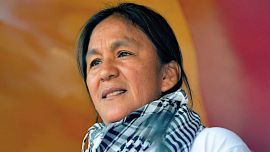Coronavirus cases may peak in Argentina sometime between the end of June and beginning of July despite cases and virus-related deaths increasing at a faster pace, according to Health Minister Ginés González García.
“We believe those weeks could be the weeks with the most cases,” González García told Bloomberg News in an interview Thursday, referring to the last week of June and first of July. He cautioned that it’s difficult to make any projections.
That timeline comes as Argentina recorded 35 Covid-related deaths Wednesday, its highest one-day number since the pandemic began. Cases are also growing at a faster pace in part because the virus has reached densely-populated, low-income neighbourhoods in the metro area of Buenos Aires.
President Alberto Fernández’s government implemented one of the earliest and strictest lockdowns on March 20 and initially projected that cases would peak in May.
The quarantine is expected to go until at least June 28, and the government late Wednesday tightened restrictions to limit circulation on public transit in the Buenos Aires area.
González García stands by the government’s decision to act aggressively and early, though in looking back can see that the government, like many worldwide, made mistakes without going into details.
“The success we’ve had in the number of cases has to do with how quickly we thought about the quarantine,” he said. Globally, “we’re all making and learning from our mistakes and the mistakes abroad. That’s been the question for Argentina, looking at everyone and trying to make sure it goes less worse here than in the rest of the world.”
Argentina ranks 34th worldwide in Covid-19 cases with 35,552 confirmed ill, dramatically lower than regional peers such as Mexico and Brazil, according to Johns Hopkins University’s Covid-19 database. Those two nations adopted much less restrictive containment measures and have become new epicentres for the pandemic.
Fernández earned praise in March for implementing a strict lockdown despite steep economic costs. The OECD forecasts Argentina’s economy will contract 10 percent this year, one of the steepest plunges worldwide.
“I think there’s an overemphasis on the tests,” González García said. “I don’t understand this idea of ‘how many tests’ as if it’s an indicator of efficiency, because the countries that have done a lot of tests aren’t doing well.”
He added: “We believe we’ve done the necessary tests.”
González García noted that within the last 80 days, Argentina has increased the number of intensive care unit beds by 35 percent, faces no shortage of respirators and 40 percent of all hospital beds remain available.
The minister also dismissed any notion that the rare political unity Argentina witnessed in March is beginning to fade, even though Fernández has criticised the City government, controlled by the opposition party, for allowing residents to go running at night.
González García says he still meets two to four times a week with health minister from different levels of government.
“Political unity has been a part of the success because it’s meant unified action,” the minister.
But Fernández’s administration has been criticised for a relatively low level of virus testing. Argentina ranks in the bottom half of South American nations in tests per 1,000 people with 3.75 on average.
Neighbouring nations Chile, Uruguay and Paraguay are conducting more tests per 1,000 than Argentina, according to data compiled by the Wilson Center in Washington.
González García downplayed the need for large-scale testing.
by Patrick Gillespie, Bloomberg






















Comments